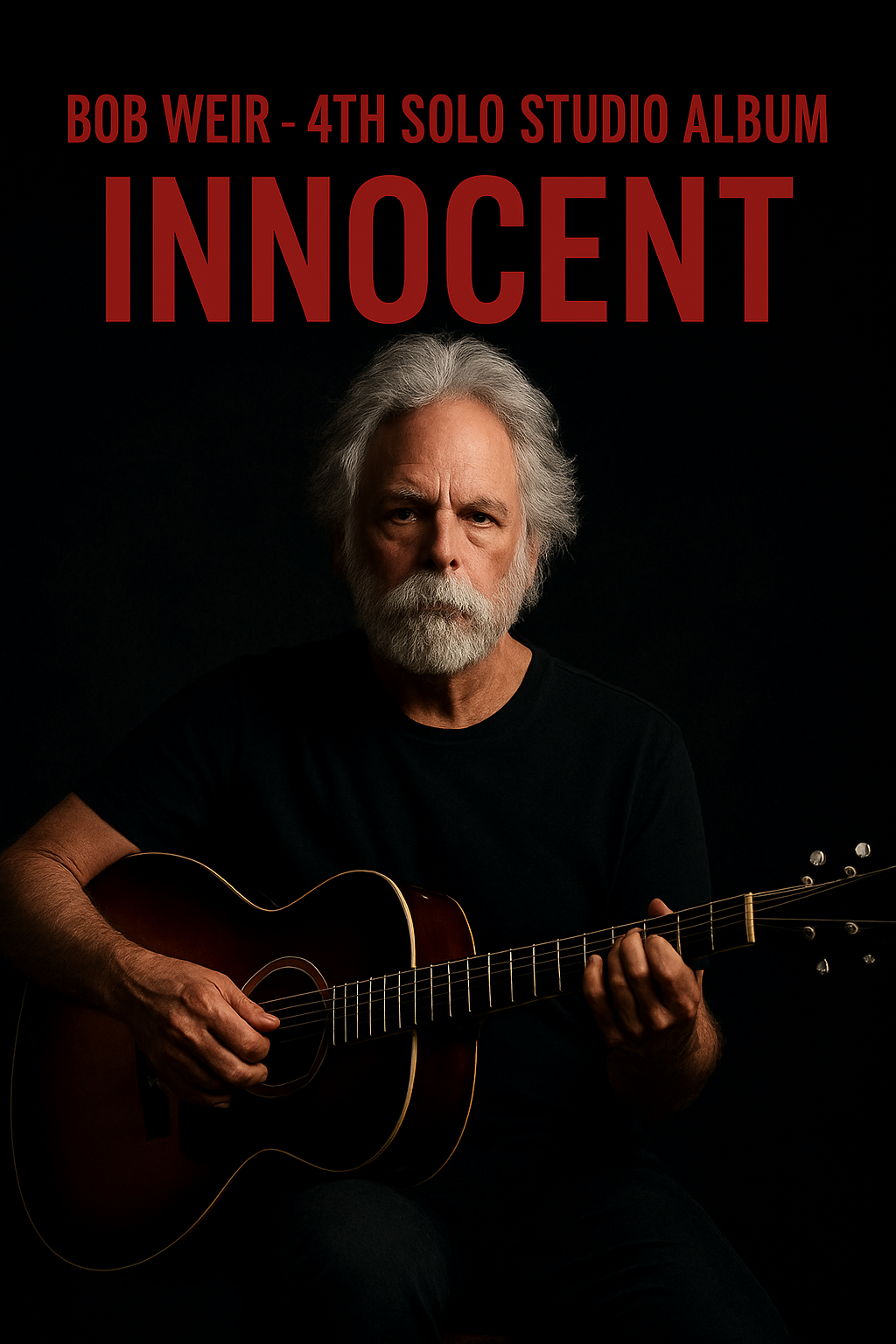Bob Weir has officially announced the release of his long-awaited fourth solo studio album, Innocent, sending waves of excitement through the music world. As one of the founding members of the Grateful Dead, Weir has spent decades shaping the sound of rock and folk music, blending poetic storytelling with timeless instrumentation. With Innocent, he revisits his roots while venturing into new creative territory, exploring the human condition through reflective lyrics and soulful melodies. Fans have eagerly awaited new solo work from the legendary guitarist, and this announcement marks a new chapter in a career that continues to evolve even after half a century.
The album, Weir revealed, was born out of quiet moments during the past few years, written between long stretches of touring and introspection. He described Innocent as a “journey of self-discovery and acceptance,” touching on themes of forgiveness, time, and the beauty of imperfection. True to his reputation, Weir merges folk, rock, and blues influences, weaving together intricate guitar lines and warm vocal harmonies that reflect both his personal growth and his signature sound.
Working with a mix of longtime collaborators and new-generation musicians, Weir created a soundscape that feels both familiar and forward-looking. The album reportedly features contributions from members of Dead & Company, as well as special guest appearances that fans are sure to recognize once the tracklist is officially revealed. Early listening sessions have drawn comparisons to Blue Mountain, his 2016 solo record, but Innocent seems to carry a deeper emotional resonance — one that feels simultaneously nostalgic and refreshingly modern.
The first single, rumored to be titled “The Other Side of Mercy,” is expected to drop later this month, offering a glimpse into the album’s tone and texture. Insiders describe it as a haunting yet hopeful song that captures Weir’s ability to balance introspection with universal emotion. His vocals, aged with character and wisdom, are said to anchor the track with a sense of quiet strength, reminding listeners why his voice remains one of the most distinctive in American music.
Weir’s songwriting on Innocent reportedly embraces simplicity and sincerity, avoiding grand statements in favor of small, intimate reflections. Each lyric feels lived-in, crafted from decades of experience on the road and an artist’s constant dialogue with his audience. There’s a sense of peace that comes through in his words — a recognition of the past, an acceptance of the present, and an openness to what lies ahead.
Recording sessions took place primarily in Northern California, where Weir surrounded himself with the natural landscapes that have long inspired his music. In interviews, he mentioned that much of the writing was done outdoors, often in solitude, with the hum of crickets and the rustle of trees serving as his metronome. This connection to nature, always present in his work, appears to have shaped Innocent into a deeply organic and atmospheric record.
While the Grateful Dead’s legacy will always be an indelible part of Weir’s story, Innocent affirms his individuality as an artist. It’s a statement of maturity — not a reinvention, but a refinement. Weir seems less concerned with nostalgia and more interested in truth, offering songs that reflect the quiet wisdom of a man who has lived through the highs and lows of an extraordinary life.
Fans have already begun speculating about whether Weir will tour in support of the album, and early reports suggest that he plans a limited series of intimate performances rather than a full-scale tour. These shows will likely focus on storytelling and acoustic arrangements, allowing the songs to breathe and resonate in smaller venues. For longtime listeners, this promises a rare opportunity to experience Weir’s artistry up close and personal.
Innocent also underscores Weir’s continuing commitment to collaboration and mentorship. In recent years, he has supported emerging artists and participated in a variety of musical projects that bridge generations. His openness to learning from younger musicians has kept his sound fresh and relevant, ensuring that his contributions to modern music remain as vital as ever.
As anticipation builds, there’s a palpable sense that Innocent will stand as one of Weir’s most introspective and heartfelt projects to date. The album’s title itself suggests a longing for purity, an attempt to strip away artifice and reconnect with the essence of human emotion. In a world often clouded by cynicism, Weir’s return feels like an act of quiet defiance — a reminder that sincerity still matters, and that music can still heal.
Critics and fans alike are already calling Innocent one of the most anticipated releases of the year. For those who have followed Weir’s journey from the psychedelic highways of the 1960s to the reflective twilight of his solo career, this album represents both continuity and renewal. It’s the sound of an artist who refuses to be confined by his past, choosing instead to keep searching, keep creating, and keep telling stories that connect across generations.
As the release date approaches, one thing is certain: Bob Weir remains as restless and inspired as ever. Innocent isn’t just a new album — it’s a testament to endurance, humility, and the eternal spark of creativity that has defined his life’s work. For fans old and new, it’s an invitation to slow down, listen closely, and rediscover the simple power of a song sung from the heart.



